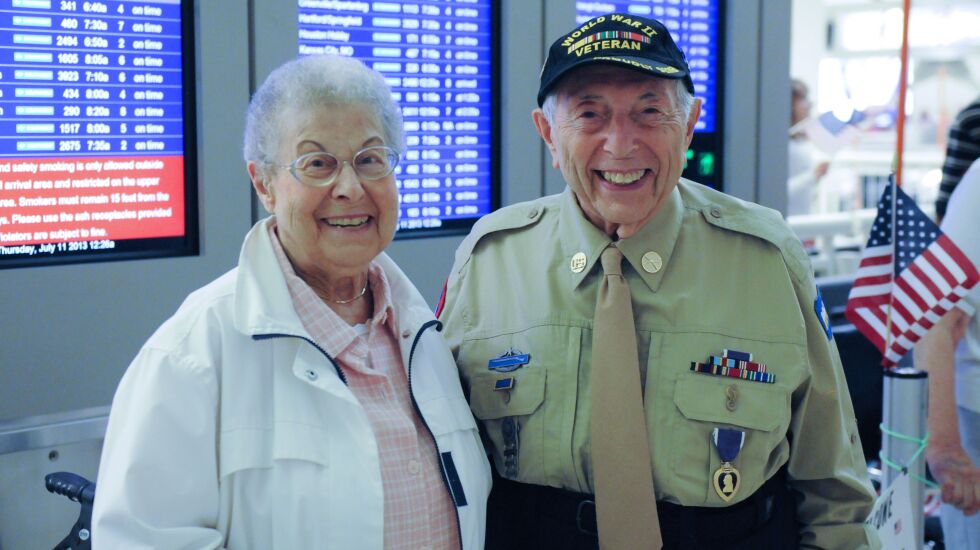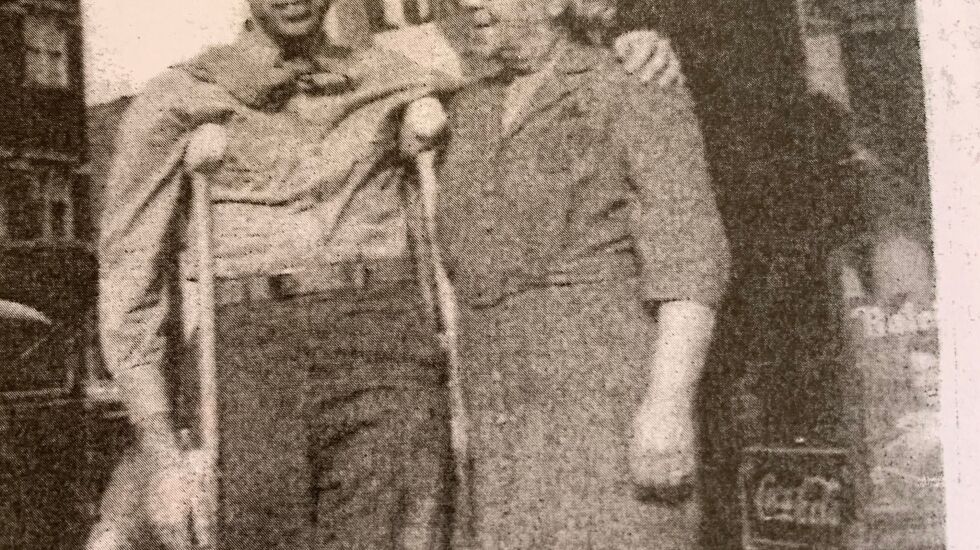
The order came to dig. Nazi artillery shells were coming.
Irving “Irv” Abramson, along with two other American soldiers, chipped away at the frozen Belgian earth with a tool that was half shovel/half axe to make a foxhole.
Eighteen inches deep was as far as they got. Explosions began at dusk and lasted for hours.
Mr. Abramson was 18. The Battle of the Bulge had begun.
The three Army soldiers lay on their sides, with Mr. Abramson, the smallest, in the middle. A joke about a sandwich was followed by prayers as the earth shook and splintered wood and red-hot shrapnel rained down.
A few months ago, Mr. Abramson recalled those terrifying moments during a filmed interview with the Portraits of Honor Project, which seeks to document the experiences of World War II veterans.
When he opened his eyes, it was daylight and a medic stood over him. Mr. Abramson raised an arm but again fell unconscious.
He woke three days later in a hospital and asked about his buddies in the foxhole. They didn’t make it.
On the left side of his body, the side that was exposed, Mr. Abramson suffered broken leg bones, a smashed knee, four broken ribs, a punctured lung and shrapnel burns.
He attributed his survival to sub-zero temperatures that kept him from bleeding out and the fact that his friends, who didn’t survive, shielded him.

It took him a year and multiple surgeries before he was released from a military hospital.
It took him nearly a lifetime, racked with survivor’s guilt, before he could talk about what happened.
After the war, Mr. Abramson returned to Chicago, where he grew up. He married, had three kids and went to work at his in-laws’ salvage yard and auto parts business.
He banned war movies or anything war-related from appearing on the television in his family’s West Rogers Park home. For years, his time in the war was not something that was talked about, his family said.
That changed when his granddaughter Deena called to ask him about his service for a school project — and he talked to her about it.
“It kind of cracked the door a little bit for him,” said Mr. Abramson’s son, Lee. “And then, a few years later, the floodgates opened when he went on a trip with Honor Flight Chicago.”
Honor Flight Chicago is a nonprofit that flies veterans to the nation’s capital to visit war memorials, providing care and accolades every step of the way — all expenses paid.
On the return flight, someone in the cabin yelped “Mail Call!” — a familiar and cherished phrase that signaled soldiers could collect their mail. Stacks of letters from family, friends and grade school kids thanking them for their service were handed to each veteran on the flight.
“I remember looking at him and just seeing how overwhelmed he was with gratitude, pride and the love he felt,” said Mr. Abramson’s grandson Jonathan Rosenblatt, who accompanied his grandfather on the trip.
Upon return, Mr. Abramson reached out to Mary Pettinato, the co-founder of Honor Flight Chicago, and told her: “I want to help. I want to volunteer. Tell me what I can do.”
She welcomed the extra hand but had no idea the extent to which Mr. Abramson would apply himself.
“After the flight, Irv sat down and wrote a letter to every large corporation he thought should know about what it is we do,” she said.
“He’d call a veteran who might be hesitant about the trip and personally ease their concerns,” she said. “You can imagine anyone in their 80s or 90s, the concerns they might have about traveling, and he’d spend hours on the phone and would greet them at the airport to welcome them home.”
Mr. Abramson became the group’s primary spokesman, giving more than 200 speeches everywhere from trade union halls to school auditoriums.
Mr. Abramson died May 16 from heart failure. He was 97.
After being introduced, Mr. Abramson, who was awarded a Purple Heart, dressed in full military uniform, would receive a standing ovation, and occasionally quip from the lectern: “As my uncle used to say, when people are smiling and clapping, you better check to see if your fly is unzipped.”
If there were gaps in funding for veterans in Illinois to participate, Mr. Abramson would call the mayor of their town.
“There was nothing to him calling and saying ‘There are people in your city waiting to fly. Do you know anyone who can help us get this done?’ There was no one he wasn’t too proud to call, and he’d share his story and they’d both be crying on the phone,” Pettinato said.
“That flight for him in 2009 was the turning point, he was able to let go of all he saw and did during the war, and he wanted others to have that privilege,” she said, noting that Mr. Abramson was making calls and giving speeches right up until the time he died.
Mr. Abramson grew up in the back of his parents’ sweets shop in a predominantly Jewish area of Albany Park. He listened to “Little Orphan Annie” on the radio any chance he got.
After graduating from Lane Tech High School, he took a few classes at the Illinois Institute of Technology. The thought of having college tuition covered by the government upon completion of military service enticed him to enlist in the Army at age 17.
After the war, he enrolled at Loyola University Chicago.
“Unfortunately by that time, I was pretty shook up with PTSD. I tried to study and concentrate, but it was quite impossible. I couldn’t,” Mr. Abramson said in the Portraits of Honor interview. “My head wouldn’t handle the volume of learning that was required. And I was fortunate enough to meet a wonderful lady that I married.”
Mr. Abramson traveled everywhere with his wife, Doris, who died in 2020. Family members joked that his lifelong effort to make her smile, often with the gift of a stuffed animal, made the two seem like newlyweds.
He moved to Skokie after his kids were grown and wrote and produced musicals for synagogues. He created games for his grandkids that included competitive coloring book races and applying masking tape to your nose.
One fond memory from his days in the service occurred aboard a train in Europe on one leg of his journey back to the United States. He began experiencing intense pain as his foot swelled beneath a cast that covered much of his lower body. A young lady appeared and asked him questions about where he was from to take his mind off the pain until medical staff arrived to help, at which point she kissed Mr. Abramson and walked off.
“The first aid guy says ‘You know who that was?’ I said ‘I haven’t the slightest idea.’ He said ‘You just made out with Marlene Dietrich,’” Abramson said.
Dietrich was a world-renowned German actress, singer and heartthrob who’d renounced her German citizenship and supported Allied troops as an entertainer with the United Service Organization.
In addition to his son, Mr. Abramson is survived by his daughters, Fran Abramson and Jan Stepanczuk, as well as 12 grandchildren and six great-grandchildren.
Services have been held.







